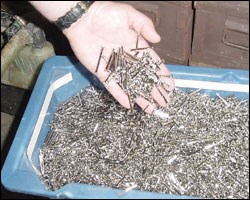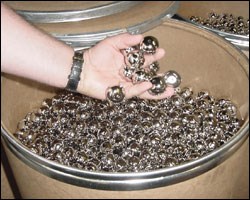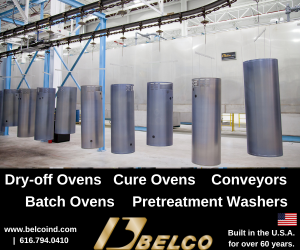Saving Valuable Bath Chemicals
Looking for new ways to save money, increase profits and remain profitable, Seaboard Metal Finishing found it in a simple piece of equipment…
Faced with shrinking profits and increased costs, many small and mid-sized plating companies are looking for new ways to lower costs, increase production and remain profitable. Fierce competition, increased labor costs and the current economic slump threaten to drive some out of business; however, there are other strategies.
Seaboard Metal Finishing in West Haven, Connecticut has built a solid strategy to help it remain profitable. Recognizing the need to stay competitive, the company partnered with local chemical and equipment distributor, Gilbert and Jones, (New Britain, CT) to keep updated on new developments in chemicals as well as state-of-the-art equipment. "Distributors are an often overlooked resource when companies are determining their purchasing strategies," Mentioned Steve Tarantino, president of Seaboard Metal Finishing. "They are the first to know about new products and, in many cases, how these new products can cut costs."
Seaboard plates parts for the automotive, marine, military, electronics, hardware, eyelet, stamping and turning, and telecommunications industries. The plating ranges from nickel to tin to a black chrome finish used mainly for the medical and military. Other specialized finishes include an antique finish for the hardware industry and the Seachrome finish, which is a tin-cobalt alloy for parts that require a decorative chrome look without the chrome.
Seaboard partnered with Gilbert and Jones without changing any of its bath chemistries. It simply wanted more control over the tin-plating baths, which are particularly expensive to run chemically. The company also wanted greater control of the brighteners in the nickel baths.
One example of cost savings suggested included the purchase of brightener feeders. Manual chemical additions were a significant cost to Seaboard. In labor alone, Seaboard figures cost savings of almost $14,000 annually by managing the chemicals automatically. The company installed seven Systematics Bathminders on both tin- and nickel-plating baths. According to Mr. Tarantino, "A couple of them have been in there for 10 years. We never had an issue with them."
By using the chemical feeders, Seaboard has not only saved money, but it has also been able to provide consistently high quality products. Staying ahead of the competition in a highly concentrated area of plating shops is difficult. High quality and consistency are crucial to keeping customers satisfied. Brightener feeders make small, regular additions of chemicals to plating baths in order to maintain a consistent plating environment and avoid rework and stripping costs associated with adding too much or too little chemical. Seaboard uses the chemical feeders on both alkaline tin and nickel baths.
Prior to using the chemical feeders, Mr. Tarantino explained, "We used to buy 400-500 lb a week of potassium stannate. Now we buy 100 lb a month. That's only because we have control of the metal through these chemical feeders. We've saved a tremendous amount of costs associated with that." In fact, the cost savings is between $250-300/week, according to Mr. Tarantino. "The nickel plating baths are controlled with chemical feeders, which does the proper amount of nickel brightener, thereby reducing the potential for too much chemical addition that can result in ductility issues as well as wasteful use of chemicals. The consistency of the final product is what we all strive for in order to maintain our competitive edge. Maintaining the proper brightener adds with a brightener feeder has reduced not only our chemical costs but also the amount of rework."
An equally important factor in Seaboard's success has been its ability to differentiate itself from its competition by providing uncommon finishes. "We offer a couple of finishes that are not that prevalent out there - black chrome and Seachrome, which is a tin-cobalt alloy finish with a chrome look. It is more environmentally friendly than traditional hexavalent chrome," stated Mr. Tarantino.
Brian Chenette, sales manager for Gilbert and Jones added, "It has many of the qualities of chrome that people look for in terms of looks and good corrosion properties without the toxicity associated with the hexavalent chrome finishing process."
Even in these difficult economic times, Seaboard maintains 24-hour operations with three shifts. Cost savings through automation, high-quality products and business savvy are the things that Mr. Tarantino is relying on to maintain that success. As far as choosing which distributor to work with, Mr. Tarantino advises companies to determine the level of support that the distributor has to offer. "When something is not working, you want someone physically there. Certainly you want to be able to reach them quickly."
Related Content
Nanotechnology Start-up Develops Gold Plating Replacement
Ag-Nano System LLC introduces a new method of electroplating based on golden silver nanoparticles aimed at replacing gold plating used in electrical circuits.
Read MoreTrivalent Chrome Overview
As the finishing industry begins to move away from the use of hexavalent chromium to trivalent chromium, what factors should finishers consider as they make new investments? Mark Schario, chief technology officer for Columbia Chemical offers a helpful overview of this complicated topic.
Read MoreLiquid Chrome Vs. Chromic Acid Flake
Contemplating how to continue offering chromic acid services in an increasingly stringent regulatory world? Liquid chrome products may be the solution you’re looking for.
Read MoreAn Overview of Electroless Nickel Plating
By definition, electroless plating is metal deposition by a controlled chemical reaction.
Read MoreRead Next
A ‘Clean’ Agenda Offers Unique Presentations in Chicago
The 2024 Parts Cleaning Conference, co-located with the International Manufacturing Technology Show, includes presentations by several speakers who are new to the conference and topics that have not been covered in past editions of this event.
Read MoreEducation Bringing Cleaning to Machining
Debuting new speakers and cleaning technology content during this half-day workshop co-located with IMTS 2024.
Read MoreDelivering Increased Benefits to Greenhouse Films
Baystar's Borstar technology is helping customers deliver better, more reliable production methods to greenhouse agriculture.
Read More













.jpg;maxWidth=300;quality=90)










